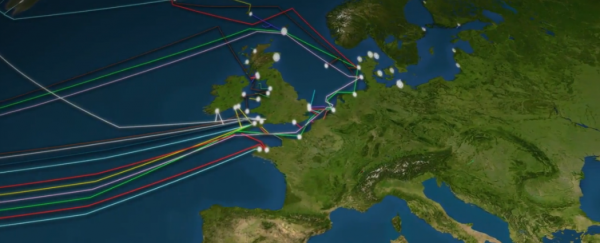There are hundreds of thousands of kilometres of submarine cables lying on the ocean floor - some of them at depths of up to 8,000 metres - and without them, we wouldn't have the Internet. In fact, these humble cables, none of which are much thicker than 8 cm, are currently transmitting 99 percent of all international data. So where in the world are they hidden? The video team at Business Insider show us the location of every single one in the awesome animation above.
The concept of submarine communications cables has been around since the 1850s, and now we have 300 of them covering a total of 885,000 km as they connect continent to continent, island to island. The longest one, according to Business Insider, runs from Germany to Korea, hitting 39 landing points on its way and stretching for almost 40,000 km.
While many of the cables follow a fairly simple straight line across the ocean to connect large areas such as North America to Europe, for example, around the smaller archapelagoes like New Guinea, things get a whole lot more complicated in order to reach everyone. And that's no easy task.
"The cables are installed by special boats called cable-layers," David W Brown explains for Mental Floss. "It's more than a matter of dropping wires with anvils attached to them - the cables must generally be run across flat surfaces of the ocean floor, and care is taken to avoid coral reefs, sunken ships, fish beds, and other ecological habitats and general obstructions."
If you're dealing with shallower waters around the coast, these ships will drag an underwater plough along the seafloor up to 1,000 metres down, creating a groove into which the cable can be laid. Sand will then naturally fall over the cables to protect them somewhat, but sometimes even your best disguise can't hide from a curious shark.
"Seismic activity is also a consideration for route planning, as underwater earthquakes could damage cables," Myles Gough reported for us earlier this year. "Damage could also be inflicted by fishing trawlers, anchors, curious sharks, or else sabotage - as is suspected of happening in Egypt in 2013."
So watch the video above to see what it takes for your country to get the Internet, and let's all collectively send good thoughts out to the sharks so they stop messing with them:
